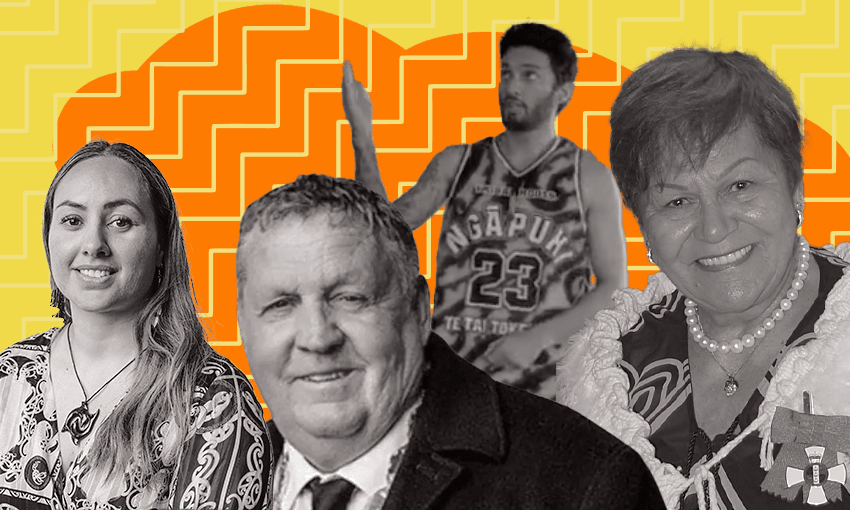Karakia is a time-immemorial practice for tangata whenua – even when certain politicians don’t want it to be.
Kaipara mayor Craig Jepson opened the Kaipara District Council’s introductory 2023 hui with a quote: “When people get used to preferential treatment, equal treatment seems like discrimination,” he said, quoting “black economist” Thomas Sowell. If Sowell was Māori many tangata whenua would call him a kūpapa – he’s an American conservative figure revered for being anti-multiculturalist, critiquing civil rights leaders and arguing that political power is unnecessary for economic advancement. The quote was pointed, after a turbulent saga in 2022 when Jepson attempted to ban karakia from council meetings but was met with the biggest protest in Dargaville history.
On Wednesday, he opened the meeting himself. But behind him, seated where members of the public are allowed, was Pere Huriwai-Seger (Ngāphui, Ngāti Porou, Te Atī Awa) wearing a Ngāpuhi singlet and waiting patiently for his moment.
Last year Kaipara made national news when Mayor Jepson banned the use of karakia to open and close council hui. Meng Foon, New Zealand’s race relations commissioner, condemned the decision. The decision was made on the spot when Kaipara’s first ever Māori ward councillor, Pera Paniora (Te Roroa, Ngāti Whātua, Te Kuihi), tried to open a meeting with a karakia. Paniora is the mokopuna of Parore Te Āwhā, one of the Ngāpuhi and Te Roroa rangatira who gifted what we now call Dargaville to Pākehā. Aotearoa Liberation League (ALL) said, “Jep bravely trampled on the mana of the tūpuna of the only Māori councillor, denying her the right to perform a 13 second karakia.”
Jepson’s reasoning was that he believed council meetings should be “secular, multicultural and respect everyone“. But it’s pretty obvious that banning a tenet of te ao Māori, with no equivalent ban of any te ao Pākehā practices, does not respect tangata whenua and promotes monoculturalism. “If he is banning karakia in Māori and allowing others to say prayers or sayings, that is racist,” Meng Foon told RNZ. Cancelling karakia ended a 25-year-old Council tradition and an ancient tangata whenua practise for… one week.
The Kaipara District Council decided to reinstate karakia in a meeting without the attendance and input of Paniora, Kaipara’s sole Māori politician. Jepson’s compromise was that karakia could once again start and end hui, but the opportunity to open hui would cycle between the elected members. ALL said the cycle gave “each councillor the authority to choose for themselves whether to honour their treaty partners or continue to shit on them.”
But it was too little too late; the mayor had already pissed off the local Māori, a bad idea for anyone in power. Jepson must have been ignorant to the obvious fact that Māori are a people of protest, never allowing guaranteed rights to be trampled on willy-nilly.
“He’s royally burned all the bridges with iwi and hapū,” Paniora told Stuff. She added, “At the end of the day, he wants to rid the council of every facet of Māori culture, Māori language. The pattern or the outcome is always to stamp out that Māori voice.” After Jepson reinstated karakia for hui, mana whenua protested him personally. A hīkoi led by Dame Naida Glavish gathered in Dargaville. “We will no longer tolerate ignorance or arrogance,” Glavish told Breakfast. Among other things, the hikoi called for Jepson’s resignation. The hīkoi was the biggest protest in Dargaville history and a petition for Jepson to step down gathered 6,000+ signatures.
At Wednesday’s hui, attendee Samah Huriwai-Seger said “Jepson used his opening remarks as an opportunity to reaffirm his position that tikanga Māori, along with any specific considerations for the crown’s partners, has no place in his council.”
So Pere Huriwai-Seger stood up and – well within the rights of mana whenua – performed a karakia. Most councillors accepted the karakia without issue, except Jepson, who tried to silence the mana whenua voice. “Sit down, please, you are out of order!” yelled the mayor. Following his karakia, Pere nodded to Jepson, politely sat and sipped a cup of tea.
By carrying out his rights as mana whenua, the rangatahi who interrupted mayor Jepson’s opening remarks continued the ancient tradition of starting hui with a karakia. These rights were affirmed in Te Tiriti o Waitangi, where it was agreed upon that te tino rangatiratanga and kawanatanga would co-exist. No matter local government procedure, any attempt to drown out te ao Māori at hui goes against Te Tiriti o Waitangi. Paniora told RNZ “tikanga stood outside that (procedure), a karakia was part of honouring the Treaty of Waitangi which was part of the law of the land and Māori lore.”
Can Kaipara get through a council meeting without trying to silence indigenous input? Tune in to the next episode of “Kaipara Karakia” to find out.





